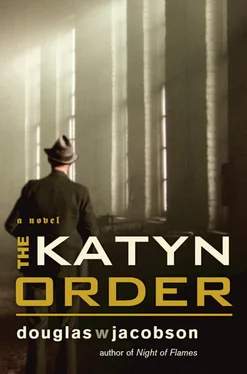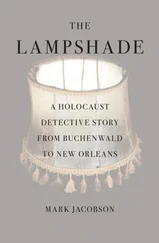“He was following orders, Adam. You know how things work. Kovalenko didn’t make that decision.” Whitehall abruptly leaned forward and set his glass on the floor. “Look, there are larger issues at stake here. We all know what’s going to happen to Poland.” Before Adam could respond, Whitehall pressed on. “Stalin’s going to swallow up Poland and everything else east of Germany. It’s a disaster, and no one’s going to stop him. Churchill saw it coming two years ago. He laid it all out for a select few of us at SOE. ‘Get proof,’ he said. ‘Get proof about Katyn—one of the most despicable war crimes in history—something even the Americans can’t ignore.’”
Whitehall glared at Adam, jabbing a pudgy finger in the air. “If there is actual proof that the NKVD carried out those murders in the Katyn Forest, and it’s made public before the start of the Potsdam conference, it might be just enough to slow down the tidal wave of communist domination that’s about to wash over Europe.”
“And you think a Russian —a general in the Red Army—is going to help you with this?” Adam couldn’t keep the scorn out of his voice.
“Kovalenko contacted me a couple of months ago,” Whitehall replied. “He said he had a lead. It had to do with this NKVD officer, Tarnov.”
“Tarnov? The same bastard who’s—”
“Yes,” Kovalenko said, “the same bastard who’s issued an arrest warrant for Ludwik Banach. Kovalenko was on to something, but he had to proceed cautiously. You can imagine how dangerous this is for someone in his position.”
Whitehall’s shoulders sagged. It was a warm night, and the drawing room windows were open, a gentle breeze floating through now and then. His starched white shirt was wet with perspiration. “We needed a go-between,” he continued. “Someone who could travel back and forth from Britain to Germany without raising a lot of flags, preferably an American… but also someone fluent in Polish, someone who knew the country and could go there if necessary. He asked me to get someone I trusted.”
“Me.”
“Yes, you. Kovalenko agreed with the arrangement. The plan was to bring you here to Germany as part of the war crimes team. That was your cover so you could operate freely between Kovalenko and me.”
“But the visit to Sachsenhausen?”
Whitehall sighed. “Just a little something extra—an enticement, so you’d be sure to accept the mission. We knew how you felt about your uncle. Kovalenko agreed to set it up. I couldn’t tell you up front because Kovalenko insisted on meeting you face-to-face before we went any further. He’s very cautious.”
Adam looked out beyond the terrace at the neatly manicured lawn, one of the few in the area being maintained. Then he turned toward Whitehall. “So, all of this about the Polish Government-in-Exile wanting to know what happened to Banach: Another of your deceptions?”
“It seemed harmless at the time.”
Adam shook his head. “Yes, harmless—until I found out about Banach and Hans Frank.”
Dinner was an elaborate affair, served in a cavernous dining room of heavy beams, walnut panels and brass wall sconces. The four-meter long, highly polished oak table was set for four with heavy white china and gold-plated flatware. At one end of the room was a two-meter-high fieldstone fireplace with an enormous elk head over the mantel, and at the other end, a magnificent, gleaming black, Steinway grand piano.
Kovalenko presided over the group with a flourish, popping the cork of a twelve-year-old Mercier Brut to get things started, followed by an elegant white Bordeaux with the first course of salmon and white asparagus. “Tonight, gentlemen, we’ll have none of that German cough syrup they serve at the Adlon,” the general proclaimed. Then, glancing at Adam he added, “I apologize for not being a better host when we first met, Mr. Nowak. The sauerbraten was little more than shoe leather.”
Even now, Adam thought, in the private company of Andreyev and Whitehall, the great general would not acknowledge their meeting in Warsaw. The meeting that ended in lies. “Well, I’ve never thought much of German food, General,” he said. “They seem more adept at starting wars than cooking.”
Kovalenko laughed heartily and slapped his hand on the table. “Well said, Mr. Nowak. Stanley, I’m sure you would agree with our American friend, wouldn’t you? Even what passes for food in London is better than dumplings the size of hand grenades swimming in brown gravy.”
Whitehall set his fork down and touched the linen napkin to his lips. “My dear friend, I must say I’m surprised to hear you disparage the food in Britain. You always seemed to devour the fish and chips—and the Boddington ale.”
This time it was Andreyev who laughed, then quickly looked down at his plate and finished off the last of his salmon.
Kovalenko, who’d already finished, set his knife and fork on the plate. “You seem in a jovial mood this evening, Captain. Perhaps you could entertain us with a tune on the piano?”
“You play the piano?” Adam remarked.
Andreyev shrugged. “Yes, a bit.”
Whitehall chimed in. “The captain is being far too modest, Adam. I’ve heard him before. He’s quite accomplished.”
Kovalenko pushed his chair back and lit a cigarette as Andreyev stepped over to the grand piano. “Yes, he is quite good… except for that disgraceful American jazz he seems to like. Bad habits he picked up when he lived there.”
“So, you spent time in the states?” Adam asked Andreyev, having suspected it given Andreyev’s excellent English. “Where did you live?”
“Washington, DC. My father was a military envoy to the U.S. He was stationed there in the early thirties. I attended Georgetown University,” Andreyev added with another little shrug.
“The captain’s family descends from aristocracy,” Kovalenko remarked with a hint of sarcasm. “But they became loyal Bolsheviks when it was the prudent thing to do.”
Andreyev took a seat at the piano with a sardonic smile, then, with a groan from the general, launched into a spirited rendition of Duke Ellington’s “Don’t Get Around Much Anymore.” When Andreyev finished, Kovalenko thrust his hands in the air as though surrendering while Whitehall and Adam applauded with enthusiasm.
Andreyev adjusted his eye patch and looked at Adam. “Perhaps a little something in honor of your birth country, Mr. Nowak?”
Adam sat back in astonishment as the Russian captain performed a brilliant interpretation of Chopin’s Nocturne no. 2. Andreyev captured with incredible grace and style the essence of the nocturne’s reflective mood, gradually becoming more passionate until, near the end, he executed a stunning trill-like passage that tapered off into a calm finish.
The group was silent as Andreyev stepped back to the table and took his seat. Adam watched Kovalenko as the burly, gray-haired general cleared his throat. Then with a softness in his eyes Adam had not seen before, he nodded at Andreyev and refilled the captain’s wine glass. This is the same man who lied to me and watched Warsaw burn? We played Chopin in Warsaw, you son of a bitch, and you sat on your ass while the Nazis destroyed us. Adam shook his head, unable to comprehend the nature of men that allowed them to appreciate fine music one moment and act as deceitful manipulators the next.
But Kovalenko recovered quickly, standing up and striding over to the sideboard where a dozen bottles of wine were lined up. “How about our second course?” he announced loudly, and the butler appeared an instant later. Kovalenko uncorked a refreshing Sancerre, and the sumptuous meal proceeded with lemon sherbet, followed by thinly sliced veal, acorn squash and two bottles of Chateauneuf du Pape ’38.
Читать дальше












